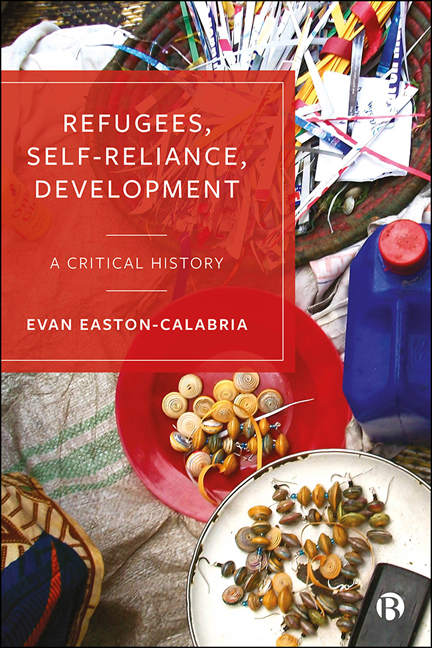Book contents
- Frontmatter
- Dedication
- Contents
- List of Figures and Tables
- Abbreviations and Acronyms
- Notes on the Author
- Acknowledgements
- 1 Introduction: Why Refugee Self-Reliance?
- 2 Self-Sufficiency out of Necessity: Refugee Self-Reliance Assistance in Interwar Greece
- 3 Socialism and Self-Reliance: Refugee Self-Reliance Assistance in Post-Colonial East Africa
- 4 Warriors of Self-Reliance: Refugee Self-Reliance Assistance in Cold War Pakistan
- 5 Dignity in Informality? Urban Refugee Self-Reliance Assistance in Kampala, Uganda
- 6 Livelihoods 2.0? Refugee Self-Reliance and the Digital Gig Economy
- 7 Conclusion
- Annex: A Note on Methods and Sources
- References
- Index
Annex: A Note on Methods and Sources
Published online by Cambridge University Press: 12 October 2022
- Frontmatter
- Dedication
- Contents
- List of Figures and Tables
- Abbreviations and Acronyms
- Notes on the Author
- Acknowledgements
- 1 Introduction: Why Refugee Self-Reliance?
- 2 Self-Sufficiency out of Necessity: Refugee Self-Reliance Assistance in Interwar Greece
- 3 Socialism and Self-Reliance: Refugee Self-Reliance Assistance in Post-Colonial East Africa
- 4 Warriors of Self-Reliance: Refugee Self-Reliance Assistance in Cold War Pakistan
- 5 Dignity in Informality? Urban Refugee Self-Reliance Assistance in Kampala, Uganda
- 6 Livelihoods 2.0? Refugee Self-Reliance and the Digital Gig Economy
- 7 Conclusion
- Annex: A Note on Methods and Sources
- References
- Index
Summary
Many of the documents I examined were project or settlement reports from UNHCR, the League of Nations, ILO, UNDP, World Bank, or national organizations such as the TCRS. These documents were often interim or final project reports which detailed the inception, funding, implementation, and outcomes of programmes. Thus, they likely targeted donors and senior organizational staff, and for this reason I treated them as valuable sources of information but not necessarily sources of ‘truth’. I specifically took potential bias into account regarding records of project success, such as the UNHCR/ World Bank project in Pakistan which employed both refugees and locals during the 1980s and was extended for multiple years. While project reports detailed the meeting of programme objectives (such as a certain percentage of refugees employed and local habitation restored), it was difficult to corroborate such statements without first-hand accounts from outside sources. However, I was able to find speeches from former UNHCR High Commissioner Hocké lauding the programme and depicting it as a model to be replicated. I also located contemporaneous secondary academic sources discussing the project as a success. What I garnered from this research of outside sources was not confirmation that the UNHCR/ World Bank project was indeed a success, but instead that it was widely presented and perceived as one, including by arguably the most influential head of an institution representing refugee assistance (UNHCR). As this, after all, was the focus of my project – to examine programmes presented as models and successes, not necessarily successful programmes themselves – this project merited inclusion.
In contrast to many of the official reports I researched, sources such as journal entries and private letters appeared to hold more reliability due to the presumed intentions with which they were written. The copious journal entries and letters to family and friends by Ruth A. Palmeree in Greece in the 1920s and 1930s, for example, appeared to be written only for her intended audience as a form of regular communication and connection, as well as personal solace. The consistent style of letters across years, which often depicted the minutiae of daily life, such as how many babies were born in the hospital she ran or the furnishings of the new apartment she moved into, demonstrated the author as a reliable narrator whose depictions could largely be understood as true according to her.
- Type
- Chapter
- Information
- Refugees, Self-reliance, DevelopmentA Critical History, pp. 206 - 207Publisher: Bristol University PressPrint publication year: 2022



